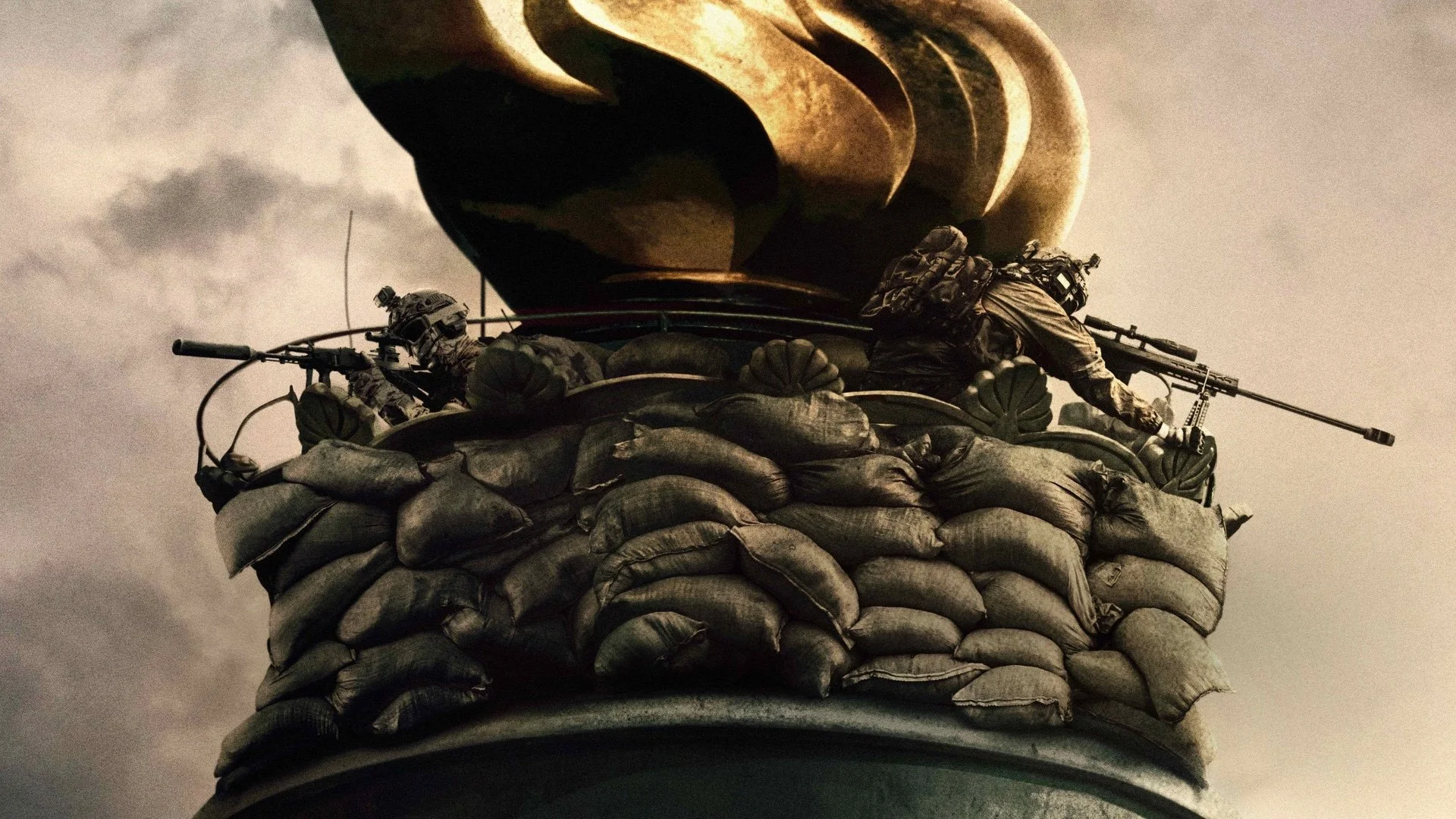
Film Review: Civil War
Film Reviews
Civil War
Director: Alex Garland
A24
In Theaters: 04.10
It’s easy to imagine a civil war in modern America. I don’t have to spell it out for you, because it’s fairly apparent that our two-party system is divided and argumentative to the point of malfunction. If there was ever a moment for the second American civil war, now would be the time, and we know exactly who the players would be. But in his film Civil War, writer/director Alex Garland is uninterested in playing to the moment. In fact, he seems completely uninterested in American politics as a whole.
Civil War follows a team of four journalists as they wind along a warzone that was once New England. They’re on a time sensitive suicide mission to Washington D.C. to interview the President of the United States before war breaks out in the fractured nation’s capitol. It’s the near future of America and the 50 states are fractured into four parties: the Loyalist States, the insurrectionist Western Forces of Texas and California, the Florida Alliance of secessionists and the New People’s Army, which is completely missing from the film. (You’d only know it if, like me, you saw the map posted to the film’s Instagram page.) Curious which states joined which sides and why? Don’t be. It’s completely arbitrary and Garland has no interest in exploring how we got here. He’s all about the now, and “near future” is a get-out-of-politics-free card for Civil War.
America’s already isolating landscape of gas stations and parking lots is made even more haunted by a flawless blend of on-location production and visual effects. The combat in the movie is grounded, thrilling and nail-biting. The sound design of certain gunshots boom and ring out with a heightened authenticity that makes you flinch. (It’s definitely better to see this film in IMAX.) Garland’s direction is strong here, particularly shining in his use of deep focus, distorting background images & colors throughout. I only wish an intense focus like this had been shared with his worldbuilding and character writing.
Our four main characters are Lee (Kirsten Dunst, The Power of the Dog, Spider-Man), Joel (Wagner Moura, Narcos), Jesse (Cailee Spaeny, Priscilla) and Sammy (Stephen McKinley Henderson, Dune). Sammy’s a New York Times writer in his twilight years, hitching a ride to Charlottesville and he’s adamant about going no further. Jesse’s a 23-year-old photographer hoping to pivot into war and worms her way into the trip. Lee and Joel are our primary duo as the film looks at how their comparative war experiences impacts Jesse’s approach to her photography.
Lee has lost herself in the firefight. She’s haunted by the images she’s seen and captured, actively giving away her safety vest and helmet because she doesn’t care if she lives or dies. She’s apathetic to the entire operation, only carrying on because getting the shots is all she has left. Joel is apparently a writer, though we never see him write and we rarely see him talking to anyone other than his fellow journalists. His main trait is his love for the thrill. He feels alive in the war zone, often grinning and laughing once a battle has died down. Dunst and Moura are giving masterful performances (as are Spaeny and Henderson, honestly), but at the end of the day, Garland isn’t interested in exploring Lee and Joel as characters so much as he is in using them to get his message across. There’s nothing wrong with this on paper, but in practice, they become so exclusively tied to their most important trait that it starts to feel like it’s all that the film has to offer: apathy toward war or the thrill of war. (Joel’s arc suffers the most, as they present him with a character-altering traumatic event before resetting him back to trait just in time for the climax.)
At no point do our core four discuss the politics of their world, which feels like Garland making a point: the politics don’t matter, it’s all bullshit anyway, all that matters is how it impacts real human lives. But even then, he hardly explores the emotional impact on Civil War America. In Garland’s America, you can be one of four things: 1) a journalist, who’s completely neutral on the whole conflict outside of getting the story, 2) a soldier, which looks and functions in the exact same way whether you’re a loyalist or a WF fighter, 3) a bloodthirsty anarchist, which makes up most of the cast, or 4) ignoring the whole thing from the comfort of your boutique and/or farm.
In my opinion, where Civil War fails is in its lack of commitment to the concept. America is, at its heart, a political experiment that’s been boiling over for 250 years. What makes a hypothetical modern American civil war uniquely interesting is what a war looks like when worn by our nation’s size and specific political ideologies. Garland sheds this and instead aims for a geographically small film with a broad “war is hell and also pointless” message paired with provocative imagery that asks, “What if it were you?” and no further questions.
Civil War is intentionally unemotional, apolitical and apathetic toward the American identity. Whether you find that the work of a subversive genius or the cop-out of an arrogant centrist, you won’t walk out of the theater considering the political ideologies of modern America. Its messaging is sure to land with anyone who’s tired of politics or has previously found it hard to empathize with conflicts overseas, but its lack of both the intellectual and emotional punches I was hoping for means I left with only one thought: Okay, we get it. –Max Bennion
Read more reviews of movies with strong world building:
Film Review: Riddle of Fire
Film Review: LaRoy Texas